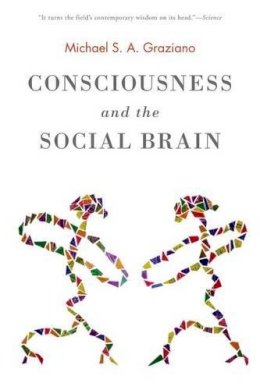
Stock image for illustration purposes only - book cover, edition or condition may vary.
Consciousness and the Social Brain
Michael S. A. Graziano
€ 28.51
FREE Delivery in Ireland
Description for Consciousness and the Social Brain
Paperback. Princeton neuroscientist Michael Graziano lays out an audacious new theory to account for the mystery of consciousness. Suitable for general readers and scientific researchers alike, Graziano's book explores the science, philosophy, and implications of linking consciousness with social intelligence. Num Pages: 288 pages. BIC Classification: JMR; JMT. Category: (G) General (US: Trade). Dimension: 210 x 142 x 21. Weight in Grams: 308.
What is consciousness and how can a brain, a mere collection of neurons, create it? In Consciousness and the Social Brain, Princeton neuroscientist Michael Graziano lays out an audacious new theory to account for the deepest mystery of them all. The human brain has evolved a complex circuitry that allows it to be socially intelligent. This social machinery has only just begun to be studied in detail. One function of this circuitry is to attribute awareness to others: to compute that person Y is aware of thing X. In Graziano's theory, the machinery that attributes awareness to others also attributes it to oneself. Damage that machinery and you disrupt your own awareness. Graziano discusses the science, the evidence, the philosophy, and the surprising implications of this new theory. Now in an affordable paperback edition!
Product Details
Publisher
Oxford University Press Inc
Format
Paperback
Publication date
2015
Condition
New
Weight
307g
Number of Pages
288
Place of Publication
New York, United States
ISBN
9780190263195
SKU
V9780190263195
Shipping Time
Usually ships in 15 to 20 working days
Ref
99-7
About Michael S. A. Graziano
Michael S. A. Graziano, Professor of Neuroscience and Psychology at Princeton University, is an internationally renowned scientist and an award-winning novelist. His books include the popular science title God, Soul, Mind, Brain and the short novels The Divine Farce, The Love Song of Monkey, and Death My Own Way.
Reviews for Consciousness and the Social Brain
Graziano's work is in important step in bridging a persistent gap between mind and brain in interdisciplinary research, notably because he attempts to answer the questions that require asking, and he does so with a remarkable level of humility.
Jean-Paul Orgeron, PhD, Department of Philosophy, State University of New York at Oneonta; Metapsychology, Online Reviews
The author offers an engaging and accessible explanation of his theory. Rather than merely touting its merits, he aims to show how it is compatible with other popular theories. Avoiding technical details, he uses anecdotes, drawings, and metaphors to convey an understanding of the important concepts. [This book] turns the field's contemporary wisdom on its head, and from its new vantage point one has the sense that an answer to the problem of consciousness might be in sight. Graziano's attention schema theory marks a milestone by offering a plausible, mechanistic answer to the hard problem."
Aaron Schurger, Science Magazine
Graziano proposes a new and intriguing theory of consciousness... [He] guides readers step-by-step through his captivating and convincing theory of consciousness, explaining how the theory accounts for many oddities in human perception. This book is an essential read for anyone interested in consciousness from either a scientific or philosophical perspective."
Library Journal
In most scientific theories, awareness emerges from the physical functioning of the brain, almost like heat rising from circuits. Laid out in his recent book...Graziano's theory takes a completely different approach to explaining consciousness. 'In this theory, the brain is an information-processing device. It doesn't produce non-physical essences
it computes information,' Graziano said. Graziano has given consciousness a more solid footing in the real, tangible world even if it remains a creation of the brain, Schurger said. 'If anything, his theory stands to demystify consciousness, in the same way that our understanding of genetics and self-organizing systems has begun to demystify 'life,' which was once thought to depend on an unseen force.'"Morgan Kelly, Princeton University News
Jean-Paul Orgeron, PhD, Department of Philosophy, State University of New York at Oneonta; Metapsychology, Online Reviews
The author offers an engaging and accessible explanation of his theory. Rather than merely touting its merits, he aims to show how it is compatible with other popular theories. Avoiding technical details, he uses anecdotes, drawings, and metaphors to convey an understanding of the important concepts. [This book] turns the field's contemporary wisdom on its head, and from its new vantage point one has the sense that an answer to the problem of consciousness might be in sight. Graziano's attention schema theory marks a milestone by offering a plausible, mechanistic answer to the hard problem."
Aaron Schurger, Science Magazine
Graziano proposes a new and intriguing theory of consciousness... [He] guides readers step-by-step through his captivating and convincing theory of consciousness, explaining how the theory accounts for many oddities in human perception. This book is an essential read for anyone interested in consciousness from either a scientific or philosophical perspective."
Library Journal
In most scientific theories, awareness emerges from the physical functioning of the brain, almost like heat rising from circuits. Laid out in his recent book...Graziano's theory takes a completely different approach to explaining consciousness. 'In this theory, the brain is an information-processing device. It doesn't produce non-physical essences
it computes information,' Graziano said. Graziano has given consciousness a more solid footing in the real, tangible world even if it remains a creation of the brain, Schurger said. 'If anything, his theory stands to demystify consciousness, in the same way that our understanding of genetics and self-organizing systems has begun to demystify 'life,' which was once thought to depend on an unseen force.'"Morgan Kelly, Princeton University News
